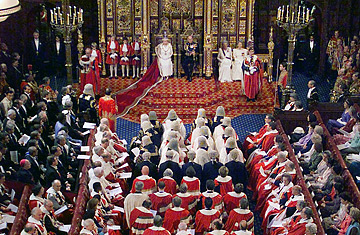
Britain's Queen Elizabeth II speaks to the House of Lords in 2001.
The next stage will seem more than a bit odd: the reform proposals will move from the House of Commons to the House of Lords ("the Other Place," as it is called in Westminster) and, next week, the peers will debate their own demise. Still, these turkeys are likely to vote for Christmas and, if they don't, the government is determined to push through changes without their assent.
Tony Blair promised Lords reform when he came to power in 1997 and two years later Labour duly replaced most of the hereditary Lords and Ladies with appointed peers, ignoring the protests of angry aristos such as the Earl of Burford, who vaulted onto the Speaker's chair, bellowing, "What we are witnessing is the abolition of Britain!" The government's attempt in 2003 to initiate a second stage of reform went nowhere when MPs rejected every option for a new upper house laid before them. The Prime Minister had argued for an all-appointed house, saying a chamber with an elected element would rival Commons.
This time, Jack Straw, the former foreign minister and current Leader of the House of Commons, masterminded the proposals, and when they were put to a vote Blair opted for a half-elected, half-appointed Lords. But he was out of step with many in his own party and in the opposition, who banded together to deliver a majority of 113 in favor of an all-elected upper chamber. Straw hailed the "historic step forward," telling the BBC: "The message was a very decisive and clear one in favor of reform of the existing House of Lords." Long before that reform is agreed and implemented, the cash-for-honors inquiry will run its course. Scotland Yard is expected to conclude its investigation within weeks. But whatever the outcome, British politics has just got a little bit more transparent.
